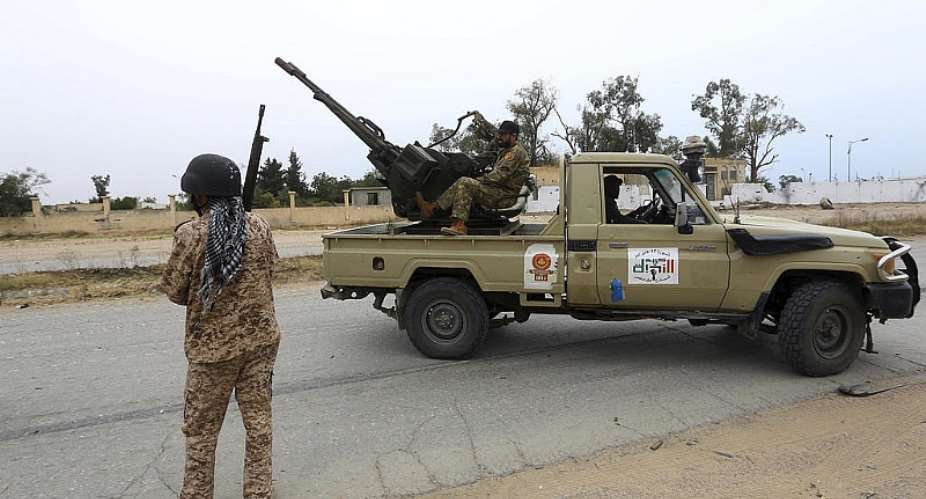Turkey's military presence in Libya is under growing pressure amid increasing international and Libyan calls for all foreign forces to leave the country. The pressure is predicted to grow as critical players in the Libyan civil war meet in Berlin this month.
Turkey has deployed hundreds of soldiers and encouraged thousands of Syrian fighters to support the Libyan Government of National Accord in its battle against forces led by General Khalifa Hafta, who is backed by Russian and Sudanese mercenaries.
Now, with a ceasefire in force and elections scheduled for December, pressure is growing for all foreign troops to leave Libya.
"There have been two UN Security Council Resolutions already for the removal of all foreign presence from Libya, be it Turkish, Russian, Sudanese, so yes, the political terrain has changed very much," said Aya Burweila, a visiting lecturer at the Hellenic National Defense College in Athens.
"There has been an increasing realisation that Turkey was building up its presence on the Mediterranean in Libya," she added. "So I think the EU, as well as the United States, had a rude awakening about Turkish intentions in Libya."
Turkish forces claim to have been 'invited'
Ankara insists Libya's internationally recognised government has invited Turkish forces. But in May, Libya's Foreign Minister Najla El-Mangoush called for all foreign fighters to quit, including Turkish soldiers.
The Turkish military has already established an airbase in Libya and, according to Turkish media reports, is seeking to build a naval base. The growing military presence has drawn intense criticism from France, with Ankara and Paris increasingly competing for regional influence.
Ilhan Uzgel, an international relations analyst who writes for the Turkish news portal Duvar, predicts that Ankara will likely yield to international pressure and partly reduce its military presence.
"The Arabs will not like it (Turkish military in Libya), the Libyan population will not like it in the mid to longer term. But for now, in order to maintain the balance of the forces in the country, they (Libya) may allow a small symbolic number of Turkish troops there. And This will make Erdogan's job easier - he can claim Turkey still has a military presence in this country.
"But Turkey will definitely withdraw the jihadists, the fighters that they carried all the way from Syria. Turkey can maintain a small number of liaison officers there, not a combat force, not a tactical force. But Turkey's military presence there is a very strong bargaining chip for Turkey," said Uzgel.
Ankara regards Libya as a bargaining token
A US defense department report last year said Turkey sent thousands of paid Syrian fighters to Libya. Ankara denies any Syrian fighters deployed in Libya have links to Jihadist groups. Turkey is currently seeking to improve relations with both Washington and the European Union, and cooperation over Libya is seen by Ankara as substantial leverage.
Turkish presidential advisor Mesut Casin defends his country's military deployment to Libya but says they are ready to withdraw under certain circumstances.
"If Turkey did not send out a military force, we will be seeing a very big conflict," said Casin, "How can we withdraw Turkish military forces? It will be possible if the other foreign forces withdraw their military people. "
However, Casin says the Turkish military can play a new important regional role in Libya.
"Turkey did not want military influence in Libya; we don't need it. But Turkey and also European Union maybe work together. Turkey aims to support the Frontex European Union border security. This is not only for Turkey, even Italy, and also Malta support this situation," added Casin.
With Libya one of the main gateways for migrants seeking to enter the European Union illegally, analysts claim Ankara is likely calculating that helping to secure the EU's southern border can give it essential future leverage.





 France cutting troops in West, Central Africa to 600: sources
France cutting troops in West, Central Africa to 600: sources
 African leaders, analysts concerned over rise of far right in France
African leaders, analysts concerned over rise of far right in France
 ‘I’m sorry’ — Kennedy Agyapong apologises to his followers for supporting Bawumi...
‘I’m sorry’ — Kennedy Agyapong apologises to his followers for supporting Bawumi...
 Don’t let Hopeson Adorye lead you to your grave; he’s cursed — Allotey Jacobs wa...
Don’t let Hopeson Adorye lead you to your grave; he’s cursed — Allotey Jacobs wa...
 No pastor can boldly say he’s richer than me; I’d have imported 5 airplanes, 5 p...
No pastor can boldly say he’s richer than me; I’d have imported 5 airplanes, 5 p...
 ‘Locked up health supplies: Gov’t made a silly mistake for letting health preven...
‘Locked up health supplies: Gov’t made a silly mistake for letting health preven...
 A prophetess, a ‘small boy’ warned Kutu Acheampong of a planned coup on specific...
A prophetess, a ‘small boy’ warned Kutu Acheampong of a planned coup on specific...
![(Rtd)Captain Joel Sowu [left] and Dr. Kwame Nkrumah](https://cdn.modernghana.com/content__/84/56/6172024123202-k5fri7t2h0-captain-joel-sowu-and-kwame-nkrumah.jpg) I must be sick in the head not to acknowledge Kwame Nkrumah as Ghana’s founder, ...
I must be sick in the head not to acknowledge Kwame Nkrumah as Ghana’s founder, ...
 ‘Common Kenkey, Gobɛ will soon be priced in dollars because the economy has been...
‘Common Kenkey, Gobɛ will soon be priced in dollars because the economy has been...
 Failed 1V1D, other wasteful projects will be eliminated if elected — Mahama
Failed 1V1D, other wasteful projects will be eliminated if elected — Mahama
